
Looking for a quick tool and resource to help with reading fluency? Check out this fun and easy poem for fluency development.
- Subject:
- Elementary Education
- Material Type:
- Lesson Plan
- Author:
- ANDREW MCKENZIE
- Date Added:
- 03/25/2022

Looking for a quick tool and resource to help with reading fluency? Check out this fun and easy poem for fluency development.

Economists can’t agree on whether investors and markets are rational and efficient, as modern financial theory assumes, or irrational and inefficient, as behavioral economists believe. Drawing on psychology, evolutionary biology, neuroscience, artificial intelligence, and other fields, Prof. Lo cuts through the debate in this course with a new framework—the Adaptive Markets Hypothesis—in which rationality and irrationality coexist.
Topics:
Introduction and Financial Orthodoxy
Rejecting the Random Walk and Efficient Markets
Behavioral Biases and Psychology
The Neuroscience of Decision-Making
Evolution and the Origin of Behavior
The Adaptive Markets Hypothesis
Hedge Funds: The Galapagos Islands of Finance
Applications of Adaptive Markets
The Financial Crisis
Ethics and Adaptive Markets
The Finance of the Future and the Future of Finance
As part of the Open Learning Library (OLL), this course is free to use. You have the option to sign up and enroll if you want to track your progress, or you can view and use all the materials without enrolling. Resources on OLL allow learners to learn at their own pace while receiving immediate feedback through interactive content and exercises.

1.364 examines site characterization and geotechnical aspects of the design and construction of foundation systems. Topics include: site investigation (with emphasis on in situ testing), shallow (footings and raftings) and deep (piles and caissons) foundations, excavation support systems, groundwater control, slope stability, soil improvement (compaction, soil reinforcement, etc.), and construction monitoring. This course is a core requirement for the Geotechnical Master of Engineering program at MIT.
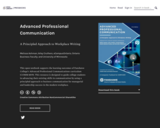
A Principled Approach to Workplace Writing
Short Description:
This open textbook supports the learning outcomes of Fanshawe College’s Advanced Professional Communications curriculum (COMM 6019). This resource is designed to guide college students in advancing their existing skills in communication by using a principled approach to business communication for managerial and leadership success in the modern workplace.
Long Description:
This open textbook supports the learning outcomes of Fanshawe College’s Advanced Professional Communications curriculum (COMM 6019). Organized in five major units— Foundational Principles of Business Messaging, The Principles of Business Style, Format, and Composition, The Principles of Social, Cultural and Employment Communication, The Principles of Report and Research Writing, and The Principles of Visual, Verbal and Group Communication—this educational resource is conveniently presented in a variety of AODA-compliant formats and written in a reader-friendly style. This textbook helps ensure that students graduate with the advanced communication skills necessary to succeed in the modern workplace from a managerial and leadership perspective.
Word Count: 277283
(Note: This resource's metadata has been created automatically by reformatting and/or combining the information that the author initially provided as part of a bulk import process.)

This text explores the philosophical ideas around aesthetics and subjectivity through the writings of Emmanuel Kant, Frederick Nietzsche, and others.
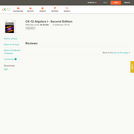
A work in progress, CK-12's Algebra I Second Edition is a clear presentation of algebra for the high school student. Topics include: Equations and Functions, Real Numbers, Equations of Lines, Solving Systems of Equations and Quadratic Equations.
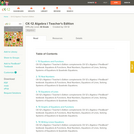
CK-12 Foundation's Algebra I Teacher's Edition FlexBook complements CK-12's Algebra I Student Edition. The solution and assessment guides are available upon request.
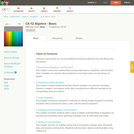
CK-12 Foundation's Basic Algebra FlexBook is an introduction to the algebraic topics of functions, equations, and graphs for middle-school and high-school students.
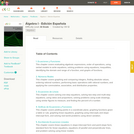
CK-12 Foundation's Algebra FlexBook is an introduction to algebraic concepts for the high school student. Topics include: Equations & Functions, Real Numbers, Equations of Lines, Solving Systems of Equations & Quadratic Equations.

This is a collection of mini lectures created by anthropologists and those in conversation with anthropology as supplimental material to assist college and university instructors who were made to shift their courses online because of COVID19.For more information, see here.To contribute, please create an OER author account and send your name and OER registered email to AnthropologyTeaching@gmail.com.
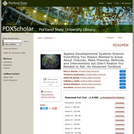
This textbook provides a toolbox, a guidebook, and an instruction manual for researchers and interventionists who want to conceptualize and study applied problems from a developmental systems perspective, and for those who want to teach their graduate (or advanced undergraduate) students how to do this. It is designed to be useful to practitioners who focus on applied developmental problems, such as improving the important developmental contexts where people live, learn, and work, including the applied professions in education, social work, counseling, health care, community development, and business, all of which at their core are concerned with optimizing the development of their students, clients, patients, workers, citizens, and others whose lives they touch.
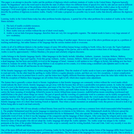
This paper speaks about Arabic and the problem of diglossia. In the paper, the author discusses the place of Arabic in the world of languages. The author also speaks about some of the aspects that make Arabic a difficult language to learn for speakers of Indo-European languages and discusses the problem of diglossia in modern Arabic. Ultimately, he makes a proposal on a possible way to teach Arabic that directly addresses the diglossia issue.

The theme that unites the Level II studios in the fall semester is a focus upon the 'making of architecture and built form' as a tectonic, technical and materially driven endeavor. It is a design investigation that is rooted in a larger culture of materiality and the associated phenomena, but a study of the language and production of built form as an integrated response to the conceptual proposition of the project. The studio will look to works of architecture where the material tectonic and its resultant technology or fabrication become instrumental to the realization of the ideas, in whatever form they may take. This becomes the 'art of technology' -- suggesting a level of innovation and creative manipulation as part of the design process to transform material into a composition of beauty and poetry as well as environmental control. In this regard the studio will look to the works and design processes of a number of architects including Shigeru Ban, Peter Zumthor, Herzog and deMeuron, Kazuyo Sejima, Richard Horden, Rick Joy and Glenn Murcutt among others.
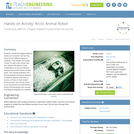
Students create four-legged walking robots and measure how far they travel across different types of surfaces. They design and create "shoes" to add to the robots' feet and observe the effect of their modifications on the net distance traveled across the various surface types. This activity illustrates how the specialized locomotive features of different species help them to survive or thrive in their habitat environments. The activity is best as an enrichment tool that follows a lesson that introduces the concept of biological adaptation to students.
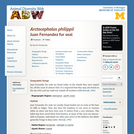
Arctocephalus philippii: Information
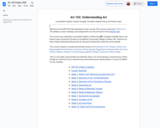
This is a ten-week course broken into thematic topics. Its current design is asynchronous online, though you will find a mix of asynchronous and synchronous activity options. It can be modified for any modality. Included are weekly activities, exercises, projects, and slides following the provided syllabus.
• ART102 Syllabus
• Week 1: What is Art? What do you want from art?
• Week 2: Elements of Art: Formal Elements
• Week 3: Elements of Art: Principles of Design
• Week 4: Describing Art
• Week 5: Media & Materials: Images
• Week 6: Media & Materials: Objects
• Week 7: Symbols & Iconography
• Week 8: Contexts of Art
• Week 9: Art and Artists
• Week 10: Public Art/Art & Controversy
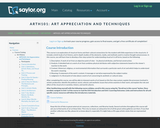
This course is an exploration of visual art forms and their cultural connections for the student with little experience in the visual arts. It includes a brief study of art history, and in-depth studies of the elements, media, and methods used in creative thought and processes. It is the only resource I have found that approximates techniques, media, and an overview of different processes that is usually the first half of a printed text on art appreciation or an introduction to art. This is geared toward an undergraduate, lower-level student population. The art history survey is inadequate, but combined with another source, like Boundless' art history, this can be a complete text for an Art 100 course.
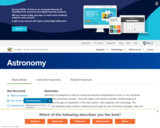
Astronomy is designed to meet the scope and sequence requirements of one- or two-semester introductory astronomy courses. The book begins with relevant scientific fundamentals and progresses through an exploration of the solar system, stars, galaxies, and cosmology. The Astronomy textbook builds student understanding through the use of relevant analogies, clear and non-technical explanations, and rich illustrations. Mathematics is included in a flexible manner to meet the needs of individual instructors.
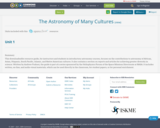
This downloadeable resource guide, for instructors and students in introductory astronomy courses, focuses on the contributions to astronomy of African, Asian, Hispanic, South Pacific, Islamic, and Native American cultures. It also contains a section on reports and articles for achieving greater diversity in science. Written by Andrew Fraknoi, the guide is part of a series sponsored by the Heliophysics Forum of the Space Missions Directorate at NASA. It includes written, on-line, and audio-visual materials, which can be used directly in the classroom, for student papers, or for personal enrichment.
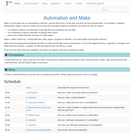
A Software Carpentry lesson to learn how to use Make Make is a tool which can run commands to read files, process these files in some way, and write out the processed files. For example, in software development, Make is used to compile source code into executable programs or libraries, but Make can also be used to: run analysis scripts on raw data files to get data files that summarize the raw data; run visualization scripts on data files to produce plots; and to parse and combine text files and plots to create papers. Make is called a build tool - it builds data files, plots, papers, programs or libraries. It can also update existing files if desired. Make tracks the dependencies between the files it creates and the files used to create these. If one of the original files (e.g. a data file) is changed, then Make knows to recreate, or update, the files that depend upon this file (e.g. a plot). There are now many build tools available, all of which are based on the same concepts as Make.